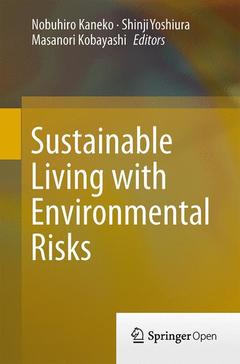Sustainable Living with Environmental Risks, 2014
Coordonnateurs : Kaneko Nobuhiro, Yoshiura Shinji, Kobayashi Masanori

Introduction.- Development Programme for Sustainable Living with Environmental Risks.- Overviews of Environmental Risk Management and Sustainability.- Land, agriculture, forestry and mangrove.- Biodiversity agriculture supports human populations.- Sustainable Management of Mangrove Forest.- Conservation and sustainable management of soil biodiversity for agricultural.- Conservation Tillage Assessment for Mitigating Greenhouse Gas Emission in Rainfed Agroecosystem.- Improvement biodiversity in Paddy Fields to Promote Land Sustainability.- Agroforestry models for promoting effective risk management and building sustainable communities.- Managing environmental risks and promoting sustainability: the case of Forest resources in Madagascar.- Sustainable forest management - achievements and challenges based on the case study in Thailand.- Chemical, waste, urban environment.- Risk management of Chemical Pollutants.- Evaluation of variable stiffness of wind turbine tower with consideration of flange - joint separation.- A research on phase separation and effect of phase separation inhibitors in Gasohol.- Research the correlation between chlorophyll-A and organic matter BOD, COD, phosphate and total nitrogen in the stagnant.- Sustainable Management of Urban Green Environments: Opportunities and Challenges.- Managing Construction Development Risks to the Environment.- Role of Communities in waste management to address environmental risks.- Ecosystems, food security, disaster and livelihood.- Necessity of adaptive risk management in fisheries and wildlife.- Ecological Impacts of Land Use Changes on Food and Health Security in Southeast Asia.- Community-Based Lake Sanctuary for Native Fish Restoration and Livelihood.- Peatland Resources: Fire Prevention and Sustainable Biodiversity Management.- Strengthening Capacity of Flood Affected Rural Communities in Padang Terap, State of Kedah, Malaysia.- Ecosystem Restoration with Near-natural Method in Shanghai.- Coastal Erosion Mitigation in Fort Dauphin, Madagascar.- Policy and institutional development, education and capacity development.- Environment and social capacity assessment for sustainability promotion and risk management.- Enhancing students' ecological thinking to improve understanding of environmental risk.- Interactive Multimedia Education System (IMES) as a International Education Platform.
Compiles practical technologies for coping with environmental risks in Asia and Africa
Provides solutions to maintain harmony between economic development and environmental preservation
Explains the role of international higher education for nurturing environmental-conscious leaders
Includes supplementary material: sn.pub/extras
Date de parution : 03-2014
Ouvrage de 286 p.
15.5x23.5 cm
Disponible chez l'éditeur (délai d'approvisionnement : 15 jours).
Prix indicatif 52,74 €
Ajouter au panier

